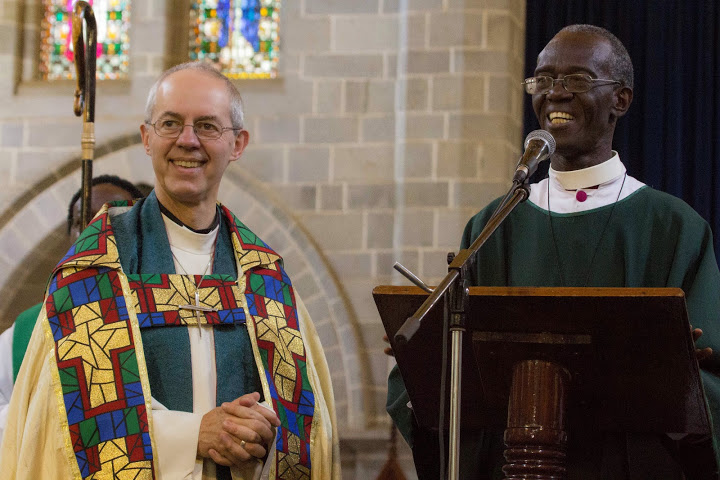Your Grace,
Greetings in the precious name of our Lord Jesus!
Thank you for your letter of 16th March and your good wishes. We do indeed rejoice in the Saviour who by his death has overcome death and it is my prayer that we may all count ourselves dead to sin and alive to God in the Risen Christ.
I note the urgency of your appeal for representation at the Anglican Consultative Council (ACC) in Lusaka next month and, as one of those Primates who have decided that I cannot authorise attendance, I feel I must respond. It was my hope that our decision taken in Canterbury to limit the participation of the Episcopal Church of the United States (TEC) would be the first step in recovering godly order and that ‘enhanced responsibility’ of the Primates Meeting, as affirmed in Lambeth 1998 Resolution III.6, to which you refer.
But now there has been a strong rejection of our moral authority by the Chairman of the ACC, Bishop Tengatenga, who has said that the ‘primates think they are more important than anyone else’ and has affirmed in clear terms that TEC will participate fully and without restriction.
This is a symptom of the problem set out so clearly by Archbishop Okoh in his statement of 15th March explaining why Nigeria also would not be participating in the Lusaka meeting. The Communion ‘Instruments’ are not being used so much as instruments of unity but as instruments to cajole orthodox Global South provinces of the Communion into acquiescence with the secular sexual culture which has made such inroads into the Anglican Churches of the West.
You rightly refer to the need for repentance and confession, which was such a feature of the East African Revival, but there does not seem to be any recognition that homosexual activity is a matter for repentance by those speaking on behalf of the London based Anglican Communion authorities. Instead there are only calls to repent of ‘homophobia’, a term which is seriously compromised by the way homosexual activists have used it to include any opposition to their agenda.
This inability to recognise that the acceptance of homosexual practice calls for repentance is now entrenched by the ‘Continuing Indaba’ programme being promoted by the Anglican Communion Office. Because it is based on the assumption that the Bible’s teaching on homosexuality and marriage is not clear, despite two thousand years of Christian teaching and tradition that it is, it becomes impossible to talk about repentance.
Instead we have to focus on processes which respect different interpretations and cultural sensibilities. I can only assume it is for this reason that you were so anxious to speak of our resolution agreed in Canterbury in terms of consequences rather than discipline or sanction. If we are truly to walk together, we must walk in the light of God’s Word. May I urge that we return to the clear standard of Scripture as affirmed by Lambeth 1998 Resolution III.5 which ‘in agreement with the Lambeth Quadrilateral, and in solidarity with the Lambeth Conference of 1888’ affirmed that the ‘Holy Scriptures contain ‘all things necessary to salvation’ and are for us the ‘rule and ultimate standard’ of faith and practice’.
In a time of widespread confusion on issues of sexuality and gender, an important test of our faithfulness to the Scriptural standard must therefore be upholding historic Anglican doctrine and teaching on marriage and sexuality as affirmed by the whole of the Lambeth 1998 Resolution I.10, including ‘rejecting homosexual practice as incompatible with Scripture’ and the Conference’s rejection of the legitimising or blessing of same sex unions and the ordination of those involved in such unions.
TEC, the Anglican Church of Canada, and a number of other provinces which are following their example, have rejected these standards yet we are expected to walk together with them. If they can disregard Scripture and the collegial mind of the Communion with impunity, I wonder what meaning there can be to what you refer to as ‘the acceptable limits of diversity’? In these circumstances, some of us have been forced to the conclusion that the best way to make our voices heard is by absence rather than presence. We have no wish to interfere in the juridical authority of other provinces, but we do have a responsibility to ensure that our recognition of one another in the Anglican family is based on a common submission to the authority of God’s Word, not simply a shared history.
I am grieved to be writing to you in such terms, but this letter comes with my best wishes for a blessed Holy Week and Easter and let me assure you of my continued prayers and affection, trusting that as we are steadfast in the work of the Risen Lord, our labour will not be in vain.
The Most Reverend Dr Eliud Wabukala,
Archbishop of Kenya and Bishop, All Saints Cathedral Diocese, Nairobi.
CC The Primates of the Anglican Communion

